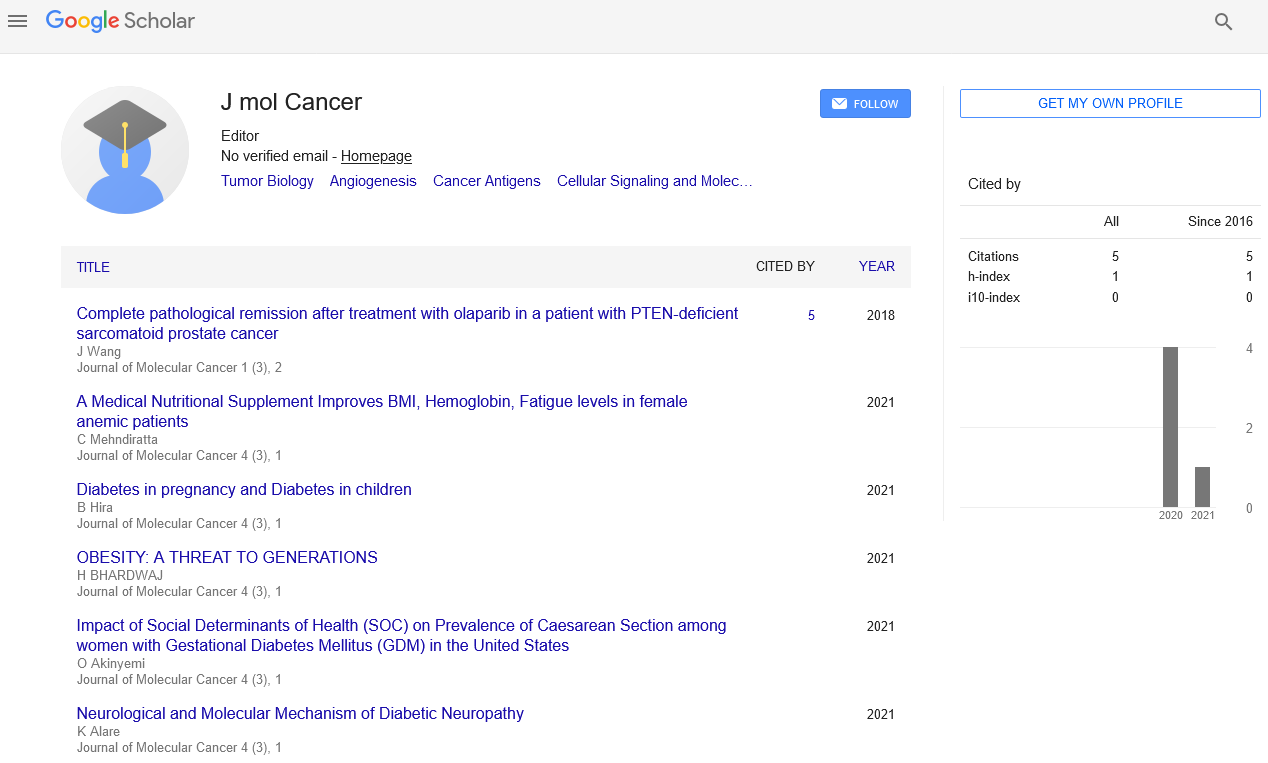Understanding cancer biomarkers: Transforming diagnosis, prognosis and treatment
Received: 20-Mar-2024, Manuscript No. puljmc-24-7161; Editor assigned: 21-Mar-2024, Pre QC No. puljmc-24-7161; Accepted Date: Apr 25, 2024; Reviewed: 10-Apr-2024 QC No. puljmc-24-7161; Revised: 17-Apr-2024, Manuscript No. puljmc-24-7161; Published: 27-Apr-2024
Citation: Walker A. Understanding cancer biomarkers: Transforming diagnosis, prognosis and treatment. J Mol Cancer. 2024; 6(2):1-2.
This open-access article is distributed under the terms of the Creative Commons Attribution Non-Commercial License (CC BY-NC) (http://creativecommons.org/licenses/by-nc/4.0/), which permits reuse, distribution and reproduction of the article, provided that the original work is properly cited and the reuse is restricted to noncommercial purposes. For commercial reuse, contact reprints@pulsus.com
Abstract
Cancer biomarkers are critical tools in oncology, offering insights into the presence, progression, and response to treatment of cancer. These biological molecules, detectable in bodily fluids or tissues, play a vital role in diagnosing cancer early, predicting patient outcomes, and personalizing treatment strategies. This article explores the various types of cancer biomarkers, their applications in clinical practice, and the advancements in biomarker research. By understanding these biomarkers, healthcare professionals can improve patient management and outcomes, making biomarker-based approaches a cornerstone of modern oncology.
Key Words
Cancer biomarkers; Early detection; Prognosis; Targeted therapy; Personalized medicine; Molecular diagnostics; Tumor markers
Introduction
Cancer biomarkers are essential substances or molecules that aid in identifying the presence, progression, or treatment response of cancer within the body. These biomarkers can be proteins, genes, or other molecules detected in blood, urine, other body fluids, or tissues. The discovery and use of these biomarkers represent a significant advancement in cancer research and clinical practice, paving the way for earlier diagnosis, more accurate prognoses, and individualized treatment strategies.
Although the concept of biomarkers is not new, the field has advanced dramatically due to significant progress in molecular biology, genomics, and proteomics. Contemporary research in cancer biomarkers focuses on finding and validating indicators that provide actionable insights into the disease. These biomarkers are generally categorized into three main types: diagnostic, prognostic, and predictive, each serving a distinct role in the management of cancer.
Diagnostic biomarkers are crucial for detecting the presence of cancer and distinguishing it from other medical conditions. For example, the Prostate-Specific Antigen (PSA) test is commonly used to screen for prostate cancer, while the CA-125 marker is employed in diagnosing ovarian cancer. The ability to detect cancer early through these diagnostic biomarkers can significantly improve treatment outcomes and survival rates.
Prognostic biomarkers provide information about the likely progression and outcome of the disease. They help in assessing the aggressiveness of cancer and its potential to advance. A notable example is the HER2/neu gene amplification in breast cancer, which serves as a prognostic marker. This marker helps predict the likelihood of cancer recurrence and influences survival estimates, thus guiding treatment decisions.
Predictive biomarkers, on the other hand, are used to forecast how well a patient is expected to respond to specific treatments. These biomarkers are essential for tailoring treatment plans to the individual by identifying which therapies are most effective. For instance, mutations in the EGFR gene in Non-Small Cell Lung Cancer (NSCLC) predict how well patients will respond to EGFR inhibitors, facilitating targeted therapies that improve treatment efficacy and outcomes.
The incorporation of biomarkers into clinical practice has transformed patient care in several significant ways:
Early detection: Biomarkers enable the detection of cancer at its earliest stages, often before symptoms are apparent. This early diagnosis is critical for initiating prompt and effective treatment, leading to improved prognoses. Liquid biopsies, which analyze circulating tumor DNA (ctDNA) or RNA, offer a novel, non-invasive method for monitoring cancer progression and assessing treatment responses.
Personalized medicine: Biomarkers facilitate personalized treatment strategies by identifying the most suitable therapies based on each patient's unique molecular profile. For example, melanoma patients with BRAF gene mutations can be treated with targeted BRAF inhibitors, which are often more effective than traditional treatments.
Monitoring disease progression and treatment efficacy: Biomarkers are used to track the progression of cancer and evaluate the effectiveness of ongoing treatments. Measuring levels of cancerspecific antigens, such as CA 19-9 in pancreatic cancer, helps determine how well the treatment is working and whether the disease is recurring.
Predicting treatment side effects: Biomarkers can also anticipate potential side effects of treatments, allowing for better management and adjustment of therapeutic approaches to minimize adverse effects.
Recent advancements in biomarker research include the application of multi-omics approaches—encompassing genomics, proteomics, and metabolomics—which offer a comprehensive view of the cancer’s molecular landscape. Technologies such as Next-Generation Sequencing (NGS) and mass spectrometry have significantly improved the precision of biomarker identification and quantification.
Additionally, expanding research into the tumor microenvironment and extracellular vesicles, such as exosomes, is advancing our understanding of cancer biology and unlocking new possibilities for biomarker discovery. These developments promise to enhance the accuracy and utility of biomarkers in cancer diagnosis, treatment, and monitoring.
In conclusion, cancer biomarkers have become indispensable tools in modern oncology. They enable earlier detection, support personalized treatment, and improve disease monitoring and management. As research continues to advance, the refinement of biomarker technologies is expected to further enhance our ability to understand and combat cancer effectively, offering hope for more precise and individualized approaches to cancer care.
Conclusion
Cancer biomarkers represent a pivotal advancement in oncology, offering crucial insights into cancer diagnosis, prognosis, and treatment. Their ability to detect cancer early, predict patient outcomes, and personalize treatment strategies has transformed the field of cancer care. As research continues to uncover new biomarkers and refine existing ones, the potential for these tools to improve patient management and outcomes will only grow. Embracing the advancements in biomarker science will be essential for advancing cancer treatment and ultimately improving survival rates and quality of life for patients.
By leveraging the power of cancer biomarkers, healthcare professionals can provide more accurate diagnoses, tailor treatments to individual patients, and monitor disease progression more effectively. The future of cancer care will increasingly rely on the integration of biomarker-based approaches, driving forward the promise of precision medicine in the fight against cancer.






